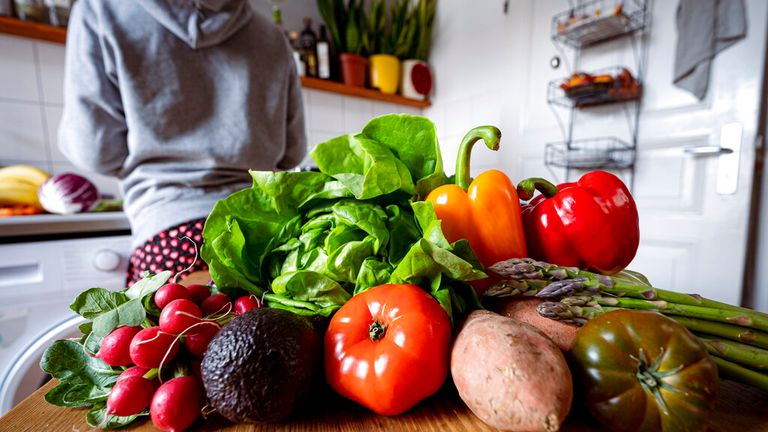COVID-19: Vegans and pescatarians less likely to get severely ill from coronavirus, study suggests
Vegans and pescatarians may be less likely to get severely ill from coronavirus, according to a new study.
The research – which took place across six countries, including the UK – showed that those who had plant-based diets were 73% less likely to develop severe symptoms from COVID-19.
People who ate fish but not meat had a 59% lower probability of getting seriously ill.
Live COVID updates from the UK and around the world
By contrast, those who ate a low-carbohydrate and high-protein diet appeared to be more likely to get seriously ill as a result of the virus.
The survey – published in BMJ Nutrition, Prevention and Health – involved health workers from six countries, including more than 2,300 who had not had COVID and 568 who had.
Of those who said they had previously had coronavirus, 46 said they followed a plant-based or pescatarian diet.
A total of 138 said they had experienced moderate to severe symptoms, while 430 had mild to very mild illness.
The US-based authors of the study said that vegan or fish-only “dietary patterns may be considered for protection against severe COVID-19”.
Listen and follow The Ian King Business Podcast here
Gunter Kuhnle, professor of nutrition and food science at the University of Reading, added: “Since the beginning of the pandemic, there has been a lot of speculation about the impact of diet on disease risk.
“This study attempts to answer this question, but there are a number of limitations that need to be considered: The study relied entirely on self-reporting, and a lot of data have shown that self-reported dietary intake is unreliable.”
But Professor Francois Balloux, of the UCL Genetics Institute, commented: “The sample size is decent, and the analyses look competently performed.
“Further validation may be required to confirm a direct, causal link between diet and COVID-19 illness severity.
“Indeed, unaccounted lifestyle variables correlated with diet might influence general health of the subjects of the study, and hence how well they coped with COVID-19 infection.”
Source: Read Full Article



